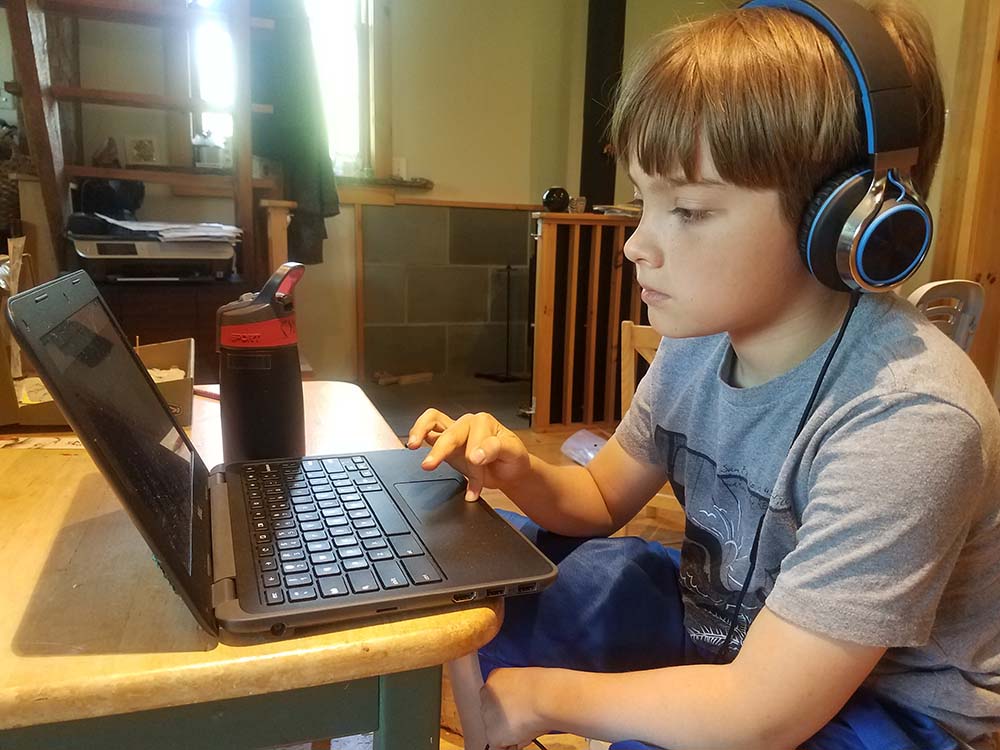

The Mount Abraham Union School District has been interviewing its students, teachers and administrators during the pandemic shutdown, asking them to reflect on the sudden changes in their working/learning lives.
Nancy Cornell, the editor and publisher of Vermont Learning, a free weekly online newspaper for educators, compiled the interviews into a comprehensive look at how folks are adapting and coping with the district’s remote learning plan. The Addison Independent published her full piece online today.
In that piece, there are interviews with a kindergartener: “Reading is hard because I’m not really good at it. I’m not really having so much fun because my friends aren’t here. It’s more fun to learn with my friends around. My teacher says she misses our hugs and I tell her I miss her and she says she misses us too.”
A second grader: “The school bus brought us a computer and we do most of our work on the computer.”
An eighth grader: “We’re the next generation and we’re going to tell our kids about this. This is our 9/11 or like other big historical events. It is going to change us, and people should believe in our generation because we have the ability to do something good. Also, we should keep thanking the teachers and administrators for all of their work.”
An eleventh grader: “Being able to build my own schedule has been great. I can find time for the things that I want to do. I have had a lot more time to get outside, and more time with my family. My sister is home from college. And getting outside to play soccer, which I usually do not have time for.”
A first-grade teacher: “If someone had asked me back in January if I thought I could do this, I would have said ‘no way.’ It has made me in some ways a much stronger teacher, more creative, tapping into more of the unstructured play, how to guide families through learning through play, using less materials because parents do not have access to all the materials we have at school. I am surprised by the whole thing and in awe of the whole COVID-19 pandemic we are in. I’m wondering what will come next? I think there are more surprises to come.”
A middle school teacher: “My own kids are in second grade — so I wake up EARLY to get a moment in before teaching and parenting chaos. I write out a schedule for our girls for the day in the morning. Then I’m alternating between instructional time with them and independent time. Their reading time of 45 minutes a day, or if they go outside for an hour — this gives me moments to do my teaching work. Each day is as regimented a schedule as possible to toggle between parenting and teaching. However, it’s hard to coordinate given the changing and in-flux nature of so many variables, though this may be ironing out.”
A high school teacher: “I’ve had the observation that things were going a little more swimmingly before the break. And after the April break it felt like some of our students are … just not handling it well. People … the administrators, the advisers, guidance counselors, coaches are doing a ton of calls. We have a lot of names of kids who seem to be struggling … it just sort of exploded right after the break.”
An elementary school principal: “Having such fabulous food service people was the biggest help. Because that was handled so well, that automatically included a delivery system for physical materials on the academic end. Very quickly the decision was made to send Chromebooks home for kids. In our school district we already had 1-on-1 Chromebooks for every kid — and so we were able to send everyone a Chromebook who needed one right off the bat, and that was a huge help. The tech team has been stellar in terms of very rapid response to any tech issues.”
A high school principal: “Schools have an energy, an infectious energy that keeps you coming in every day and keeps your ‘why’ at the forefront. Not having personal connections with students and watching the magic of learning happening is incredibly challenging.”
And a superintendent: “Perhaps not a surprise, but a highlight has been how everyone has really risen to the challenge. People are stepping up and doing remarkable things, figuring it out and making it happen. This has been a great opportunity to witness the best in people. People are choosing to celebrate what’s going well, and I hope that’s something that sticks.”
Want to read the full interviews? Click on the links below.
• Part Two: What have been your biggest challenges or concerns related to your work during this time?
• Part Three: What have been the most helpful supports for you so far in shifting the way you work?
Photo of a MAUSD elementary school student participating in remote learning. Photo provided by MAUSD.

I haven’t seen one comment from 5/6 grade parents. For me it has been a nightmare. I am concerned my child has 0 ability to work independently. He doesn’t follow directions and needs his hand held to accomplish every assignment. The worst part is I had no idea…until now. I am not sure I am qualified for what I am in for…..